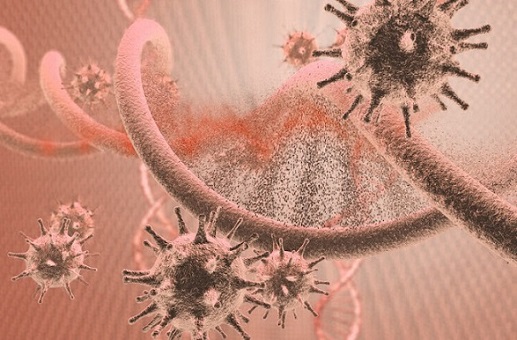BREAKING! HBV Viral Gene Fragments Integrating into the Human Genome are Fueling Liver Cancer Progression!
Nikhil Prasad Fact checked by:Thailand Medical News Team May 23, 2025 8 months, 3 weeks, 1 day, 50 minutes ago
Medical News: A new study by researchers from Fudan University, Zhongshan Hospital, and the Shanghai Medical College in China has uncovered how specific fragments of hepatitis B virus (HBV) DNA that integrate into the human genome can act as powerful triggers for liver cancer. These integrated viral sequences, now named “HBV-SITEs” (HBV Sequences Integrated To Enhancers), are not just passive remnants of infection—they actively fuel the development and spread of hepatocellular carcinoma (HCC), the most common form of liver cancer.
 HBV Viral Gene Fragments Integrating into the Human Genome are Fueling Liver Cancer Progression
HBV Viral Gene Fragments Integrating into the Human Genome are Fueling Liver Cancer Progression
This
Medical News report highlights how these HBV-SITEs—particularly one called HBV-SITE-1—boost the activity of nearby cancer-related genes by latching onto special gene control switches in our DNA called enhancers.
The Dangerous Role of HBV-SITE-1 and Its Viral microRNA
In experiments using liver cancer cells, patient blood samples, and mouse models, the scientists found that HBV-SITE-1 contains a microRNA called HBV-miR-2. This tiny RNA molecule acts like a remote control, turning on genes that help cancer cells grow, spread, and avoid death. In fact, HBV-SITE-1 triggered the activation of over 1,500 cancer-linked genes, including TERT and CDK8, both well-known for supporting tumor survival and expansion.
What makes the discovery more alarming is the fact that HBV-miR-2 levels rise steadily over time in patients—first in chronic hepatitis, then in liver cirrhosis, and finally peaking in liver cancer. These levels could be detected in blood plasma, making HBV-miR-2 a potential new biomarker for tracking disease progression.
Interestingly, different HBV genotypes behave differently. The version of HBV-SITE-1 from genotype B (common in East Asia) was found to be extremely cancer-promoting. In contrast, the version from genotype H (found mostly in Central and South America) has a single mutation (T > G) in the HBV-miR-2 sequence that weakens its cancer-driving power.
A Simple RNA Inhibitor Can Stop the Cancer Process
The most hopeful part of the study is that the harmful effects of HBV-SITE-1 can be blocked. The team developed an “antagomir”—a small synthetic RNA that neutralizes HBV-miR-2. When they introduced this antagomir into infected liver cells and mice, it dramatically reduced the activity of cancer-promoting genes. It even shrank tumors and prevented liver fibrosis, a key step before cancer.
In infected human liver cell models grown for 28 days, mimicking the full course of liver disease, the antagomir suppressed hundreds of dangerous genes related to cell growth, inflammation, blood vessel formation, and extracellular matrix buildup. Many of these genes, like COL1A1 and LOXL2, are closely tied to cancer and were effectively silenced.
A New Frontier in Liver Cancer Treatment
This research introduces a new an
d promising approach for treating HBV-related liver cancer by targeting the integrated viral sequences themselves—specifically, by shutting down their enhancer-like activities. The HBV-SITEs, especially HBV-SITE-1, are not just genetic leftovers; they are active drivers of cancer. More importantly, they can be stopped.
The authors conclude that viral DNA sequences integrated into our genome can act like Trojan horses—disguised and dangerous—actively changing how our cells work. But with the help of simple, targeted RNA therapies like HBV-miR-2 inhibitors, we now have the potential to block these harmful viral triggers and possibly reverse or prevent liver cancer.
The study findings were published in the peer reviewed Journal of Experimental & Clinical Cancer Research
https://link.springer.com/article/10.1186/s13046-025-03413-8
For the latest on Liver Cancer, keep on logging to Thailand
Medical News.
Read Also:
https://www.thailandmedical.news/news/scientists-from-finland-warn-that-sars-cov-2-may-trigger-cancer-in-a-manner-similar-to-other-oncogenic-viruses
https://www.thailandmedical.news/news/covid-19-triggers-chronic-gastritis-alters-stomach-cell-functions-and-push-gastric-cells-toward-cancer-like-states
https://www.thailandmedical.news/news/covid-19-can-cause-an-autoimmune-related-blood-complication-known-as-antiphospholipid-syndrome
https://www.thailandmedical.news/articles/coronavirus
https://www.thailandmedical.news/pages/thailand_doctors_listings
